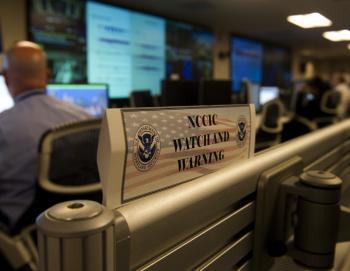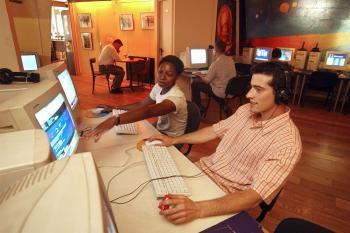[xtypo_dropcap]T[/xtypo_dropcap]he computer and the Internet have been taken out of the “tech” corner and have evolved into a serious tool with serious issues associated with it. The Internet is increasingly becoming a great part of our daily life. This is increasing so fast and affecting so many people that governments are taking a much closer look at what is being done on the Internet.
It is now possible to hack into and control pacemakers for the human heart over the Internet. While this was actually discovered in 2008, it did not make many headlines until 2010.
At the end of this summer, technology websites and other media reported how a computer virus infecting an air-traffic control computer may have downed Spanair flight 5022.
Another recent example is the Stuxnet Virus. This is an advanced piece of computer programming, heavily disguised, and made with one very specific target: the Bushehr nuclear power plant in Iran.
These examples are serious threats. With threats to human life surfacing, the question of how much people should be allowed to do what they want on the Internet presents itself. Historically, the Internet (which has actually been around for over 40 years) was a “free-for-all” of sort. It was supposed to be like “International waters” where laws quickly become gray when data crosses borders.
Voice of America (VOA) hosted a live panel titled, “Online Freedom vs. National Security: Finding a Middle Ground,” on Oct. 13. This forum, coupled with live webcast, had a variety of speakers from both ends of this topic, media and government.
VOA was founded in 1942, and describes itself as “an international multimedia service funded by the U.S. government.” Today they are very active in both free speech in the media, as well as, topics in the world of current technology. A quick look at their home page reveals just how in touch they are with changes in Internet technology and international issues connected to it.
This forum covered a lot of ground on the subject of online freedom vs. national security: from computer criminals taking advantage of people, to governments spying on their own citizens, to international threats such as the Stuxnet worm. The issues covered affect a vast majority of the people on this planet.
The panelists all have expertise in technology, but from different sides of the playing field—government, research scientist, technology journalist. They all pretty much agree on the goal, despite their different point of view on how to get there. This gives us an optimistic view of how things may go in the future regarding both Internet security as well as people’s rights.
Continued on the next page...
Doug Bernard, the Head of the Digital Frontier project at VOA, hosted the event. Doug is no stranger to these topics, as he reports on them himself on voanews.com. Toward the beginning of the panel, he explained why they decided to hold the panel: to discuss how a middle ground must be found while dealing with these issues—a balance between both human rights and battling computer crimes or computer based terrorism.
The speakers got right to business, even during the introductions. Greg Nojiem wanted to share with the audience just how vulnerable we as Internet users really are: vulnerable not only to criminals, but to governments as well. He was quick to point out how surveillance laws were about 40 years out of date and really have no bearing on computer technology. He said there was no legislation even written to protect data from cell phone transmissions.
Martin Libicki, Senior Management Scientist of the RAND Corporation, pointed out how international surveillance holes may actually be exploitable by computer criminals. He also explained how certain organizations were considering banning infected computers from the Internet and how it is really not the users’ fault that they were given vulnerable products that are susceptible to malware.
Other Guests were Ambassador Philip Verveer, U.S. Coordinator for International Communications and Information Policy, Nancy Scola, Associate Editor for techPresident.com, and Richard McNally, the FBI section chief for counterterrorism and counterintelligence. Ambassador Verveer presented a sobering thought: criminals with technology too advanced, such as heavy encryption, would make it too difficult to fight computer crimes—an argument similar to the idea of criminals having better guns than police.
In recent months, computers and the Internet have now become a heavy political issue—the Internet blockades of Iran, the Green Dam in China, The Stuxnet worm. Now some governments are actively banning certain technologies.
As for governments being involved in what we do on the net and how we do it, there is always the question of “how much say should any government have?”
Internetfreedom.org, for example, suggests that users should decide what they see on the Internet. Others, such as the Chinese Communist Party, make it clear that they want complete control over the Internet and to take control away from the users.
We got to see an example of these differing points of view during the 2009 communications lock-down in Iran during their election. The Iranian government wanted no information being leaked outside of the country, but Iranian citizens bypassed the media block using software called FreeGate.
In the U.S., there have been ongoing discussions about “net neutrality” and the FCC. “Net neutrality” is the idea that the Internet customer should have access to any content they want and not be controlled by any other entity. For the time being, Internet use is not heavily limited in most countries. There are a few countries, that make serious attempts to filter Internet content.
It is now possible to hack into and control pacemakers for the human heart over the Internet. While this was actually discovered in 2008, it did not make many headlines until 2010.
At the end of this summer, technology websites and other media reported how a computer virus infecting an air-traffic control computer may have downed Spanair flight 5022.
Another recent example is the Stuxnet Virus. This is an advanced piece of computer programming, heavily disguised, and made with one very specific target: the Bushehr nuclear power plant in Iran.
These examples are serious threats. With threats to human life surfacing, the question of how much people should be allowed to do what they want on the Internet presents itself. Historically, the Internet (which has actually been around for over 40 years) was a “free-for-all” of sort. It was supposed to be like “International waters” where laws quickly become gray when data crosses borders.
Voice of America (VOA) hosted a live panel titled, “Online Freedom vs. National Security: Finding a Middle Ground,” on Oct. 13. This forum, coupled with live webcast, had a variety of speakers from both ends of this topic, media and government.
VOA was founded in 1942, and describes itself as “an international multimedia service funded by the U.S. government.” Today they are very active in both free speech in the media, as well as, topics in the world of current technology. A quick look at their home page reveals just how in touch they are with changes in Internet technology and international issues connected to it.
This forum covered a lot of ground on the subject of online freedom vs. national security: from computer criminals taking advantage of people, to governments spying on their own citizens, to international threats such as the Stuxnet worm. The issues covered affect a vast majority of the people on this planet.
The panelists all have expertise in technology, but from different sides of the playing field—government, research scientist, technology journalist. They all pretty much agree on the goal, despite their different point of view on how to get there. This gives us an optimistic view of how things may go in the future regarding both Internet security as well as people’s rights.
Continued on the next page...
Doug Bernard, the Head of the Digital Frontier project at VOA, hosted the event. Doug is no stranger to these topics, as he reports on them himself on voanews.com. Toward the beginning of the panel, he explained why they decided to hold the panel: to discuss how a middle ground must be found while dealing with these issues—a balance between both human rights and battling computer crimes or computer based terrorism.
The speakers got right to business, even during the introductions. Greg Nojiem wanted to share with the audience just how vulnerable we as Internet users really are: vulnerable not only to criminals, but to governments as well. He was quick to point out how surveillance laws were about 40 years out of date and really have no bearing on computer technology. He said there was no legislation even written to protect data from cell phone transmissions.
Martin Libicki, Senior Management Scientist of the RAND Corporation, pointed out how international surveillance holes may actually be exploitable by computer criminals. He also explained how certain organizations were considering banning infected computers from the Internet and how it is really not the users’ fault that they were given vulnerable products that are susceptible to malware.
Other Guests were Ambassador Philip Verveer, U.S. Coordinator for International Communications and Information Policy, Nancy Scola, Associate Editor for techPresident.com, and Richard McNally, the FBI section chief for counterterrorism and counterintelligence. Ambassador Verveer presented a sobering thought: criminals with technology too advanced, such as heavy encryption, would make it too difficult to fight computer crimes—an argument similar to the idea of criminals having better guns than police.
In recent months, computers and the Internet have now become a heavy political issue—the Internet blockades of Iran, the Green Dam in China, The Stuxnet worm. Now some governments are actively banning certain technologies.
As for governments being involved in what we do on the net and how we do it, there is always the question of “how much say should any government have?”
Internetfreedom.org, for example, suggests that users should decide what they see on the Internet. Others, such as the Chinese Communist Party, make it clear that they want complete control over the Internet and to take control away from the users.
We got to see an example of these differing points of view during the 2009 communications lock-down in Iran during their election. The Iranian government wanted no information being leaked outside of the country, but Iranian citizens bypassed the media block using software called FreeGate.
In the U.S., there have been ongoing discussions about “net neutrality” and the FCC. “Net neutrality” is the idea that the Internet customer should have access to any content they want and not be controlled by any other entity. For the time being, Internet use is not heavily limited in most countries. There are a few countries, that make serious attempts to filter Internet content.



